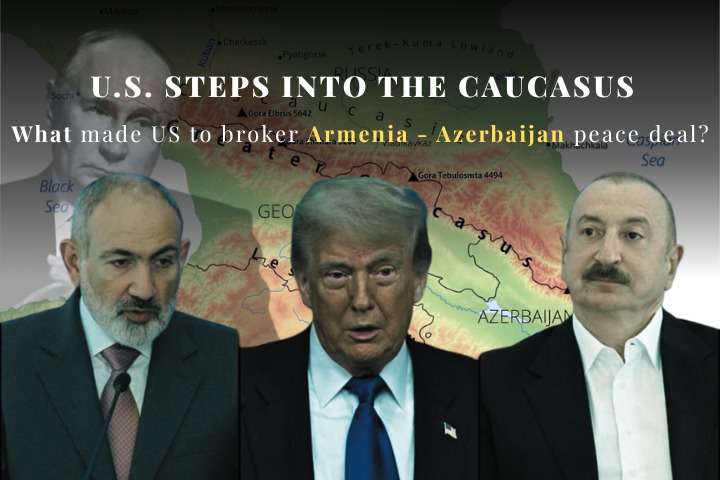A decision that could reshape the South Caucasus and change the region’s power dynamics, U.S. President Donald Trump welcomed Armenian Prime Minister Nikol Pashinyan and Azerbaijani President Ilham Aliyev to the White House to sign a historic peace agreement. The accord calls for a formal end to longtime hostility, but the ramifications include not only Armenia and Azerbaijan, but also regional trade corridors and global power tensions.
The Peace Deal at Glance
The main feature of the agreement is the development of the “TRIPP” Corridor – i.e., the Trump Route for International Peace and Prosperity. This strategic transit link will connect mainland Azerbaijan to its landlocked (due to the surrounding hostile parties) Nakhchivan exclave via Armenian territory. The corridor will encompass railway lines, energy pipelines, and fiber-optic cables all operated and owned by a U.S. consortium under a 99-year lease from Armenia.
The U.S. refers to the project as a “Crossroads of Peace” the aim of which is to make a conflict zone a center of commerce, connectivity, and collaboration.
The Moment to Exploit Russia’s Declining Influence
This deal comes at a time when Russian influence in the South Caucasus is fading. With the Russian inability to stop Azerbaijan’s takeover of Nagorno-Karabakh in 2023, in addition to its war in Ukraine, Moscow leaves a void for power.
Washington’s mediation is also seen as a bid to replace Russia as the region’s primary broker, presenting Armenia and Azerbaijan with an alternative partner for stability, infrastructure, and trade. This is also a signal to other post-Soviet states: U.S. engagement is a viable alternative to Moscow’s orbit.
Why Does The U.S. Care? The Political, Strategic, and Economic Benefits
Political Benefits
- Positions Trump as a global dealmaker in advance of U.S. elections.
- The south Caucasus region has traditionally been in the Russian sphere of influence. This reasserts the U.S. posture as an active peacemaker in regions under the dominance of Russia historically.
Strategic Advantages
- Armenia–Azerbaijan corridor lies along one of the east-west transit routes. By anchoring itself in this deal, the U.S. gains a permanent foothold on a geopolitical crossroads linking the Caspian Sea to Europe via the Black Sea and Turkey (a position of logistical value).
- Russia’s credibility as a security guarantor has collapsed after its failures in the 2020 and 2023 Nagorno-Karabakh conflicts. Meanwhile, China has been expanding its BRI infrastructure across Central Asia and into the Caucasus. A U.S.-backed corridor weakens both. Denying Moscow political leverage and creating a competing infrastructure network to Beijing’s trade ambitions.
- Strengthens U.S. ties with NATO ally Turkey through Azerbaijan.
- Provides a future point of intelligence collection as well as rapid troop movement near Russia, Iran, and the Black Sea. Also enables faster military deployments to NATO’s southeastern flank.
Economic Benefits
- The proposed deal reportedly includes a 99-year U.S.-backed infrastructure arrangement, essentially giving American stakeholders generational control over trade, energy, and digital routes in the Caucasus.
- Azerbaijan already exports oil and gas to Europe through pipelines that avoid Russian and Iranian territory.
- A U.S.-backed corridor expansion could handle more capacity, reduce Europe’s dependence on Russian energy, and open investment avenues for American energy firms.
- The corridor plan isn’t just about roads and pipelines, it includes laying high-speed fiber-optic cables linking the Caspian to Europe.
- Stimulates trade and investment opportunities in Armenia, Azerbaijan, and more broadly Central Asia.
Reactions by Armenia and Azerbaijan
Armenia:
Armenia, feeling betrayed by Russia’s inaction during Azerbaijan’s 2023 military operation in Nagorno-Karabakh, is increasingly open to Western mediation. Prime Minister Nikol Pashinyan has been pivoting toward the EU and U.S., seeing them as more reliable guarantors of security and economic growth than Moscow. However, domestic opinion is still split, with some wary of abandoning Russia completely.
Azerbaijan:
Azerbaijan views the deal as a way to solidify its territorial gains and unlock massive economic potential via new trade routes. President Ilham Aliyev also benefits politically by being seen as a partner to both Turkey and the U.S., diversifying Azerbaijan’s alliances while retaining leverage over Russia. That said, Baku will still maintain pragmatic ties with Moscow to avoid direct confrontation.
Beyond the Peace Deal: The Larger Context
The takeaway of this agreement is that it is not just a war-ending agreement – but who will determine the future of the South Caucasus region. By embedding itself in the core economic infrastructure of the region for almost one hundred years, the U.S. gets political influence, strategic play, and long-term economic gains, while Russia loses one of its most important geopolitical footholds.
As the ink dries on the agreement, one thing is clear: the South Caucasus is entering a new era one in which Washington, not Moscow, may set the terms of peace, trade, and connectivity.

